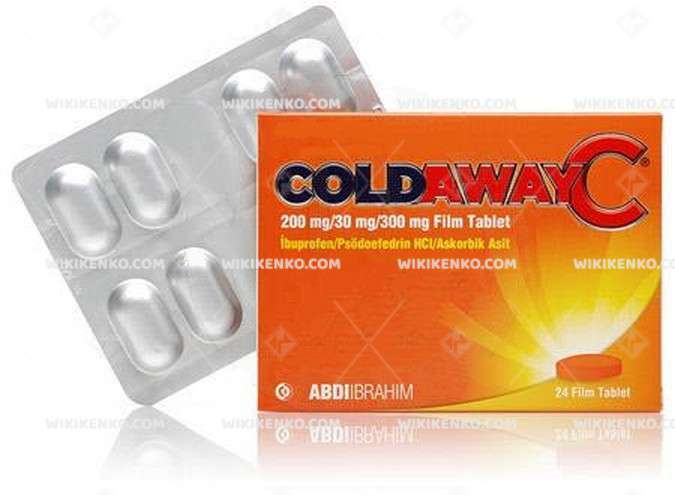Coldaway-C Film Tablet
Coldaway-C, a film-coated tablet designed to alleviate the distressing symptoms of colds and flu. Learn about its composition, mechanism of action, correct usage, essential precautions, and potential side effects.
| Dosage form | |
|---|---|
| Pack size | |
| Potency | Combined |
| Manufacturer | |
| Origin | |
| Generic Name (Ingredient) | Ibuprofen 200 Mg Pseudoephedrine Hydrochloride 30 Mg Ascorbic Acid (Vitamin C) 300 Mg |
Assuming your emergency circumstances for this product, visit Urgent Quotation page. Besides, for any pharmaceutical questions, please ask us in the comments section.
Description
Unveil the power of Coldaway-C, a remarkable film-coated tablet engineered to provide comprehensive relief from the discomforts of colds and flu.
Ingredients
Explore the therapeutic blend of active ingredients that make this tablet a potent solution for cold and flu symptoms:
Triple Action Relief: Each Coldaway-C tablet combines 200 mg of ibuprofen, 30 mg of pseudoephedrine hydrochloride, and 300 mg of ascorbic acid (vitamin C) for a threefold approach to symptom relief.
Dosage and Administration
Master the appropriate dosage and administration to ensure optimal effectiveness:
Recommended Dosing: The ideal dosage and duration of treatment should be determined by a healthcare professional based on individual patient needs.
Mechanism of Action
Gain insight into how Coldaway-C works to combat cold and flu symptoms:
Ibuprofen Power: As a nonsteroidal anti-inflammatory drug (NSAID), ibuprofen possesses analgesic and antipyretic properties, effectively reducing fever and alleviating headaches and body aches.
Pseudoephedrine Relief: Pseudoephedrine acts as a potent decongestant, narrowing blood vessels in nasal passages to provide relief from nasal congestion.
Administering
Discover the proper method of administering Coldaway-C to achieve optimal results:
Oral Consumption: this tablet is taken orally, ensuring efficient absorption for prompt relief.
Precautions
Understand essential precautions when using this tablet:
Allergic Sensitivities: If you are allergic to ibuprofen, pseudoephedrine hydrochloride, or any excipients in the product, refrain from using Coldaway-C.
History of Blood Cell Count Decrease: Individuals with a history of severe blood cell count decrease should avoid this tablet.
Side Effects
Explore potential side effects associated with Coldaway-C and their occurrence:
Mild and Temporary Effects: Common side effects include irritability, insomnia, dizziness, headache, dry mouth, nausea, vomiting, abdominal pain, and diarrhea.
Seeking Medical Attention: Although side effects are generally mild and temporary, if severe or persistent symptoms occur, seek medical attention promptly.
Pregnancy and Breastfeeding
Address concerns about using it during pregnancy and breastfeeding:
Pregnancy Considerations: It is not recommended to use Coldaway-C during pregnancy. Delay initiation of the medication until after pregnancy, without the need for prior pregnancy testing.
Limited Data for Breastfeeding: The use of Coldaway-C during breastfeeding remains under limited information. Seek medical advice for individualized guidance.
Comparing with Other Cold and Flu Medications
Explore a comparative analysis of Coldaway-C with other cold and flu medications:
Cold and Flu Relief: This tablet offers a powerful combination of ibuprofen, pseudoephedrine hydrochloride, and vitamin C, uniquely addressing multiple symptoms.
Choosing the Right Medication: Different formulations cater to varying needs, making it essential to select the most suitable option.
Conclusion
Coldaway-C, the film-coated tablet, emerges as a reliable ally against cold and flu symptoms, providing multi-symptom relief with its potent formulation. Embrace the comfort and wellness offered by this tablet and take control of your health during cold and flu season.
Use the form below to report an error
Please answer the questions as thoroughly and accurately as possible. Your answers will help us better understand what kind of mistakes happen, why and where they happen, and in the end the purpose is to build a better archive to guide researchers and professionals around the world.
The information on this page is not intended to be a substitute for professional medical advice, diagnosis, or treatment. always seek the advice for your physician or another qualified health provider with any questions you may have regarding a medical condition. Always remember to
- Ask your own doctor for medical advice.
- Names, brands, and dosage may differ between countries.
- When not feeling well, or experiencing side effects always contact your own doctor.
Cyberchondria
The truth is that when we’re sick, or worried about getting sick, the internet won’t help.
According to Wikipedia, cyberchondria is a mental disorder consisting in the desire to independently make a diagnosis based on the symptoms of diseases described on Internet sites.
Why you can't look for symptoms on the Internet
If diagnoses could be made simply from a textbook or an article on a website, we would all be doctors and treat ourselves. Nothing can replace the experience and knowledge of specially trained people. As in any field, in medicine there are unscrupulous specialists, differences of opinion, inaccurate diagnoses and incorrect test results.





Reviews
There are no reviews yet.